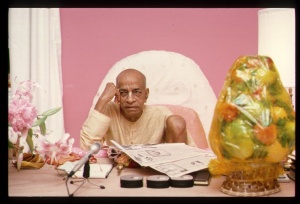SB 7.15.41

A.C. Bhaktivedanta Swami Prabhupada
TEXT 41
- āhuḥ śarīraṁ ratham indriyāṇi
- hayān abhīṣūn mana indriyeśam
- vartmāni mātrā dhiṣaṇāṁ ca sūtaṁ
- sattvaṁ bṛhad bandhuram īśa-sṛṣṭam
SYNONYMS
āhuḥ — it is said; śarīram — the body; ratham — the chariot; indriyāṇi — the senses; hayān — the horses; abhīṣūn — the reins; manaḥ — the mind; indriya — of the senses; īśam — the master; vartmāni — the destinations; mātrāḥ — the sense objects; dhiṣaṇām — the intelligence; ca — and; sūtam — the chariot driver; sattvam — consciousness; bṛhat — great; bandhuram — bondage; īśa — by the Supreme Personality of Godhead; sṛṣṭam — created.
TRANSLATION
Transcendentalists who are advanced in knowledge compare the body, which is made by the order of the Supreme Personality of Godhead, to a chariot. The senses are like the horses; the mind, the master of the senses, is like the reins; the objects of the senses are the destinations; intelligence is the chariot driver; and consciousness, which spreads throughout the body, is the cause of bondage in this material world.
PURPORT
For a bewildered person in the materialistic way of life, the body, the mind and the senses, which are engaged in sense gratification, are the cause of bondage to repeated birth, death, old age and disease. But for one who is advanced in spiritual knowledge, the same body, senses and mind are the cause of liberation. This is confirmed in the Kaṭha Upaniṣad (1.3.3-4,9) as follows:
ātmānaṁ rathinaṁ viddhi
śarīraṁ ratham eva ca
buddhiṁ tu sārathiṁ viddhi
manaḥ pragraham eva ca
indriyāṇi hayān āhu
viṣayāṁs teṣu gocarān
so 'dhvanaḥ pāram āpnoti
tad viṣṇoḥ paramaṁ padam
The soul is the occupant of the chariot of the body, of which the driver is the intelligence. The mind is the determination to reach the destination, the senses are the horses, and the sense objects are also included in that activity. Thus one can reach the destination, Viṣṇu, who is paramaṁ padam, the supreme goal of life. In conditioned life the consciousness in the body is the cause of bondage, but the same consciousness, when transformed into Kṛṣṇa consciousness, becomes the cause for one's returning home, back to Godhead.
The human body, therefore, may be used in two ways — for going to the darkest regions of ignorance or for going forward, back home, back to Godhead. To go back to Godhead, the path is mahat-sevā, to accept the self-realized spiritual master. Mahat-sevāṁ dvāram āhur vimukteḥ (SB 5.5.2). For liberation, one should accept the direction of authorized devotees who can actually endow one with perfect knowledge. On the other hand, tamo-dvāraṁ yoṣitāṁ saṅgi-saṅgam: if one wants to go to the darkest regions of material existence, one may continue to associate with persons who are attached to women (yoṣitāṁ saṅgi-saṅgam). The word yoṣit means "woman." Persons who are too materialistic are attached to women.
It is said, therefore, ātmānaṁ rathinaṁ viddhi śarīraṁ ratham eva ca. The body is just like a chariot or car in which one may go anywhere. One may drive well, or else one may drive whimsically, in which case it is quite possible that he may have an accident and fall into a ditch. In other words, if one takes directions from the experienced spiritual master one can go back home, back to Godhead; otherwise, one may return to the cycle of birth and death. Therefore Kṛṣṇa personally advises:
aśraddadhānāḥ puruṣā
dharmasyāsya parantapa
aprāpya māṁ nivartante
mṛtyu-saṁsāra-vartmani
"Those who are not faithful on the path of devotional service cannot attain Me, O conqueror of foes, but return to birth and death in this material world." (BG 9.3) The Supreme Personality of Godhead, Kṛṣṇa, personally gives instructions on how one can return home, back to Godhead, but if one does not care to listen to His instructions, the result will be that one will never go back to Godhead, but will continue life in this miserable condition of repeated birth and death in material existence (mṛtyu-saṁsāra-vartmani).
The advice of experienced transcendentalists, therefore, is that the body be fully engaged for achieving the ultimate goal of life (svārtha-gatim). The real interest or goal of life is to return home, back to Godhead. To enable one to fulfill this purpose, there are so many Vedic literatures, including Vedānta-sūtra, the Upaniṣads, Bhagavad-gītā, Mahābhārata and the Rāmāyaṇa. One should take lessons from these Vedic literatures and learn how to practice nivṛtti-mārga. Then one's life will be perfect. The body is important as long as it has consciousness. Without consciousness, the body is merely a lump of matter. Therefore, to return home, back to Godhead, one must change his consciousness from material consciousness to Kṛṣṇa consciousness. One's consciousness is the cause of material bondage, but if this consciousness is purified by bhakti-yoga, one can then understand the falsity of his upādhi, his designations as Indian, American, Hindu, Muslim, Christian and so on. Sarvopādhi-vinirmuktaṁ tat-paratvena nirmalam (CC Madhya 19.170). One must forget these designations and use this consciousness only for the service of Kṛṣṇa. Therefore if one takes advantage of the Kṛṣṇa consciousness movement, his life is certainly successful.